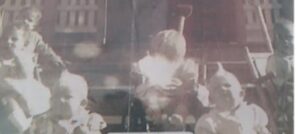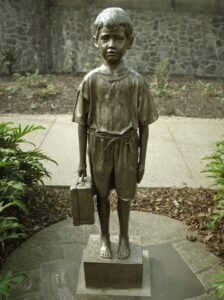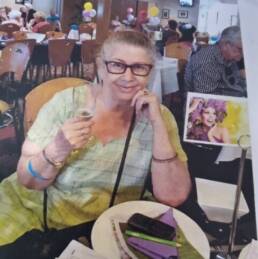These stories may contain descriptions of childhood trauma and abuse. Aboriginal and Torres Strait Islander people should be aware that this website may contain images, voices or names of people who may have passed away. If you need help, you can find contact details for some relevant services on our support page.
Queensland based activist, Bambi, was in children’s homes and foster care before she was adopted.
Bambi was only two months old when she and her twin sister, Sandy, were left by their mother in the Diamantina Receiving Depot and Infant’s Home in Wooloowin, a suburb of Brisbane, Queensland. The girls were there until they were six months old and able to be transferred to the nearby St Vincent’s Home for Children at Nudgee.

Sandy died when she was less than three years old, but Bambi was never told that or about the circumstances of her sister’s death. Therefore, she spent hours each day for Sandy.
Life at St Vincent’s was difficult in other ways too:
I was often called uncontrollable and placed in a dark cupboard or the upstairs attic for hours at a time, often for doing nothing wrong. At times I was put in a cupboard and left there for days at a time by the older girls who were in charge of us little ones. I remember not being fed as they would forget about me. At night times the older girls would frequently lock me inside the boiler room for the night if I didn’t keep quiet, sometimes they’d tie me to one of the pipes. The big girls would threaten to hurt me if I told. These bigger girls often held me underwater for lengthy periods at bath time and made me eat my own vomit if I threw up.
In addition, Bambi was sexually abused by visiting priests and verbally abused by staff who would call her a “bastard” and the “spawn of the devil” because her mother wasn’t married and her father was a Muslim.
Bambi was often unwell and at one point was diagnosed with epilepsy; the medication adversely affected her education as it caused sleepiness and difficulties with concentrating.
When she was well, Bambi was compelled to work in the Home:
…making beds, sweeping, washing the verandah, polishing the floors, washing up, helping the other girls get dressed and put on their shoes. Older girls had heavier jobs, just like slaves. We did the dirty work, scrubbing the floors, ironing, sewing and darning, mending and making new clothes, or filling up the mattresses when they’d gone flat…No end to the work.
Religion was a feature of Bambi’s time in the home too. Saying the rosary, praying, singing in Latin.
Hours of prayer, on your knees, the self-sacrifice of praying. It made me very tired and sore. It was another sort of punishment for kids.
There were some good times too. For example, when the archbishop would visit and throw hard-boiled lollies on the floor and the children would scramble after them.
And at Easter there was:
a large, colourful donated Easter egg made from icing sugar, decorated with sugar flowers. Every Easter it was broken up and shared between all of us and the nuns as well. It came on our plates.
Bambi was sent into foster care “many times” but was rejected by the foster carers because, she says, she wet the bed and had nightmares.
In 1956, Bambi was sent to live at Tuffnell Home in Nundah, an inner suburb of Brisbane. Tuffnell Home was a Protestant Children’s Home run by the Society of the Sacred Advent, an Anglican order founded in Brisbane in 1892.
At the age of twelve, Bambi was adopted by the foster family she was living with in Nundah. The family then moved from Sydney to Granville in western Sydney, and then to Narrandera, a small town in the Riverina region of southern NSW. They never stayed in one place for long.
The nightmares and bedwetting continued and on top of that, the child had to catch up on twelve years of life outside an institution:
…learn my new name, new address and had to catch up on twelve years of life in the normal world… I had problems understanding. It seemed I was from another planet. I had night sweats every night, yelling in my dreams… I found it hard getting used to my new life.
Bambi’s adoptive parents took care to ensure that the girl’s bronchial problems were properly treated and sent her off for elocution lessons to correct a stutter.
However, they also made her work in their shop before and after school and often beat her for “minor errors.”
Bambi also witnessed her father stabbing her mother, causing the woman to be hospitalised for six weeks.
When her adoptive father strangled Bambi, she had an out-of-body experience. As she came back to her body, she said:
I came to you with nothing. Now I will leave with nothing.
The love died.
As a young adult, Bambi studied and became a nurse’s aide at Leeton District Hospital, 33 kilometres north-west of Narrandera.
She was happy in her work until her adoptive parents insisted she go to Holland to visit relatives. There, Bambi lived with an aunt and grandfather in the Hague for about three years, learned to speak and read Dutch, and started work with the Ministry of Defence as a typist. It was a difficult time.
Bambi remained at the Ministry of Defence for seven years, while working to get her Dutch visa and working permit which took three years. Until then and unbeknownst to her, Bambi was working illegally. The General at the Ministry of Defence was supportive and encouraging of Bambi, assuring her she would get the documentation she needed. Bambi also received support to learn Dutch and was promoted along the way.
After Bambi married, she lived with her in-laws in Pakistan for twelve months, learning Urdu and how to cook the local food, and getting to know the family.
Bambi returned home to Australia with her two sons in 1984. She began searching for her birth family, eventually locating grandparents, an aunt, a step-father, two brothers—both named Jack—and two sisters. They are beautiful people.
We had a big dinner to celebrate our family reunion after forty years apart. It was a fantastic feeling of belonging to a family who cared and were blood relatives. Knowing you have someone who cares and needs you and loves you is a great feeling.
In 1991, Bambi returned to the Netherlands. Her husband kidnapped her sons and smuggled them from the Netherlands to Pakistan, two weeks before the divorce was supposed to be finalised. The boys were away from Bambi for approximately seven years while she and husband were going through the divorce.
Bambi returned to Australia in 1993.
She began connecting with others who had grown up in institutions in 1998. Victim-survivors all wanted those who had abused them—physically, emotionally, sexually—to be held to account for their maltreatment and, because of their lobbying, what is known as the Forde Inquiry—Commission of inquiry into abuse of children in Queensland institutions—was established in 1998.
During the inquiry I was not sure I was brainy enough to speak up. I felt stupid and frightened to open my mouth in case I made a fool of myself…Then I was put on the spot – for a second I couldn’t think of what to say. I felt embarrassed and shaky. After I finally spoke, a lady said, “You don’t know what you’re talking about.” So I shut down in disgust with myself. I was upset that I couldn’t say what I was trying to say.
A formal apology “To those Harmed in Queensland Institutions during their Childhood” was made on behalf of the Queensland Government and six church organisations in 1999. This was followed on 16 November 2009 by a national apology to Forgotten Australians and former child migrants delivered by Prime Minister Kevin Rudd in Canberra.
Bambi has benefited from the support provided by Lotus Place since 1998.
We do all sorts of activities – sewing and mending, BBQs, photography, reunions, art group, tai-chi, cooking club, drama, fitness, creative writing and there’s always tea and coffee, newspapers, internet access and lounge and Foxtel. There are quit smoking programs, dental treatments, life skills training, counselling and referral services…Everything is happening for us.
Bambi remains concerned about the impact on the children of victim-survivors.
Many of us reached adulthood with social and emotional deficits, and when we had families of our own we were not able to cope due to our lack of education and life skills…Therefore, we passed on many of our problems to another generation, putting them at a disadvantage and making them too, victims of our institutional abuse. I didn’t know how to give the love and security I should have to my children. I apologise to my children who I love dearly. Our children need an apology from the Government for the mistreatment and the lack of a duty of care to us.

Bambi was involved in lobbying for a memorial for Forgotten Australians. This one of a boy, with artwork by Gavan Fenelon, was erected in 2004 at Emma Miller Place, Roma Street, Brisbane. The inscription reads: “In memory of all children who suffered and of those who did not survive abuse in Church and State children’s institutions and homes in Queensland.”
References:
“Commission of inquiry into abuse of children in Queensland institutions.” Find & Connect, 2014. https://www.findandconnect.gov.au/guide/australia/FE00116
“Diamantina Receiving Depot and Infants’ Home (1910-1962).” Find & Connect, 2019. https://www.findandconnect.gov.au/guide/qld/QE00193
Lotus Place. https://www.lotusplace.org.au/
“Memorials for Forgotten Australians.” Forde Foundation, 2020. https://fordefoundation.org.au/resources/memorials-for-forgotten-australians/
“National Apology.” Parliament of Australia, 2009. https://www.aph.gov.au/parliamentary_business/committees/senate/community_affairs/completed_inquiries/2004-07/inst_care/national_apology/index
“Queensland Apology – 1999.” Forde Foundation. http://fordefoundation.org.au/wp-content/uploads/2020/01/1.pdf
“St Vincent’s Home for Children (1935-1971).” Find & Connect, 2021. https://www.findandconnect.gov.au/guide/qld/QE00155
“Tufnell Home (1901-1993).” Find & Connect, 2018. https://www.findandconnect.gov.au/guide/qld/QE00172
Images supplied by Bambi
